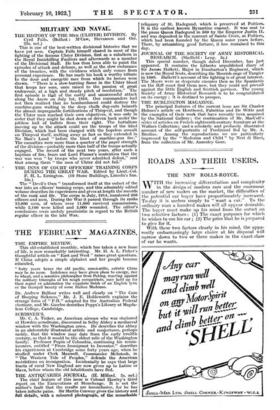MILITARY AND NAVAIJ.
This is one of the best-written divisional histories that we have yet seen. Captain Falls himself shared in most of the fighting of the famous Ulster Division, first as a subaltern in the Royal Inniskilling Fusiliers and afterwards as a member of the Divisional Staff. He has thus been able to paint the episodes of attack and defence, as well as the slow endurance of the trenches, with the vividness which only comes from personal experience. He has made his book a worthy tribute to the dour and energetic race from which its heroes were drawn. " There is a slow-burning flame in the Ulster blood that keeps her sons, once raised to the passion of great endeavour, at a high and steady pitch of resolution." The first episode is that of the costly and unsuccessful attack along the Ancre on July 1st, 1916. Our commanders had not then realiied that no bombardment could destroy the machine-guns waiting in the deep chalk dug-outs beneath the almost impregnable fortifications of Thiepval, and though the Ulster men reached their own objectives, it was only m order that they might be shot down or driven back under the pitiless hail of bullets from their right. The battalions moving up to the attack could see the troops of the 32nd Division, which had been charged with the hopeless assault on Thiepval itself, melting away as fast as they extended in No Man's Land " before the blast of machine-gun fire." The casualties were more than a quarter of the paper strength of the division—probably more than half of the troops actually engaged. The record of the next two years, after such a baptism of fire, bears out Lord Plumer's contention that the
• war was won " by troops who never admitted defeat," and that among them •" the men of Ulster did not fail."


































































 Previous page
Previous page